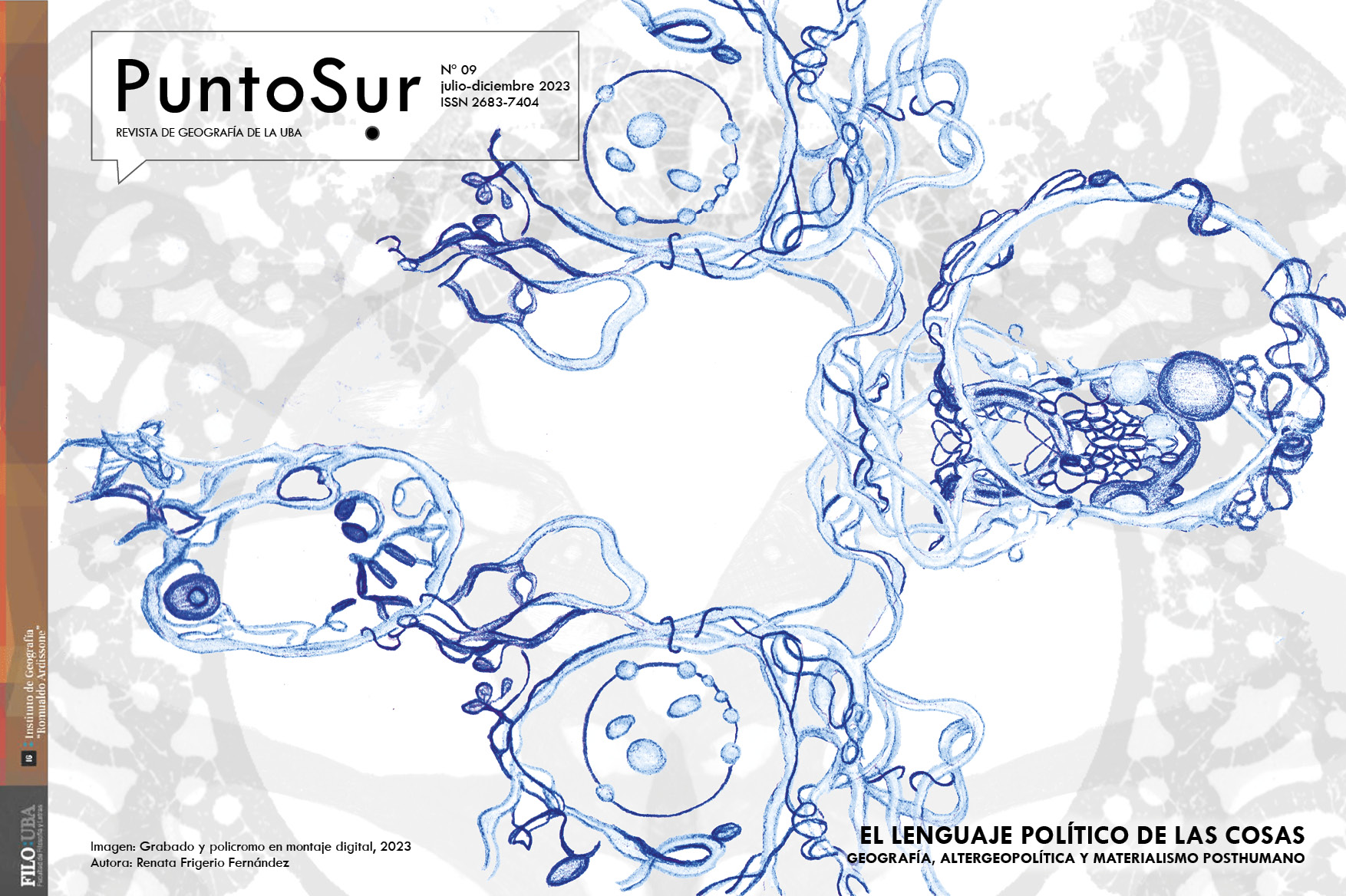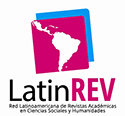Posthuman geographies in Patagonia-Aysén: thresholds, shores, and intersections between animal ∩ human
Abstract
This paper is interested in verifying the processes of deterritorialization and reterritorialization of human-non-human assemblages in Patagonia-Aysén. For this reason, it will be important to focus on the co-production that the superficial swarm of their associations implies and from where the bodies of the puma, the cow and the subjects that we will call border and environmental will emerge, among others. Its values and senses, as we are interested in showing, do not have any transcendence and there are only hierarchies or games of force between them. Finally, we are interested in make evident the role of capital in these production processes as far that it enhances its surplus value from the economy of desire and the politics of images to build a territory where "dominated subjects" will consume the new states from where have been produced.Downloads
References
AUTOR, XXXX. Stitching together the nation's fabric during the Chile uprisings: towards an alter-geopolitics of flags and everyday nationalism. Geoforum, 122, 22-31.
Cano, M. (2015). Nuevos materialismos: hacia feminismos no dualistas. Oxímora Revista Internacional de Ética y Política, 7, 34-47. Disponible en: https://revistes.ub.edu/index.php/oximora/article/view/14416/17829
Carman, M. (2017). Las fronteras de lo humano. Cuando la vida humana pierde valor y la vida animal se dignifica. Buenos Aires, Siglo XXI.
Coccia, E. (2021). Metamorfosis. Buenos Aires: Cactus editorial.
Carvalho, I. C. y Steil, C. A. (2018). Diálogos con Tim Ingold. Diferentes aportes en el ámbito de la antropología fenomenológica. Tópicos del Seminario, 39, 101-124. Disponible en: https://www.scielo.org.mx/scielo.php?script=sci_arttext&pid=S1665-12002018000100101
Deleuze, G. (2014). Conversaciones. Valencia: Pre-textos.
Deleuze, G. (2017). Diferencia y repetición. Buenos Aires: Amorrortu editores.
Deleuze, G. (2021). Derrames. Entre el capitalismo y la esquizofrenia. Buenos Aires: Cactus Editorial.
Deleuze, G. y Guattari, F. (2014). El Anti Edipo. Capitalismo y esquizofrenia. Barcelona: Paidós.
Deleuze, G. y Guattari, F. (2015). Mil mesetas: Capitalismo y Esquizofrenia. Valencia: Pre-textos.
Despret, V. (2022). Habitar como pájaro. Modos de hacer y de pensar territorios. Buenos Aires: Cactus editorial.
Fujita, J. (2021) ¿Cómo imponer un límite absoluto al capitalismo? Filosofía política de Deleuze y Guattari. Buenos Aires: Tinta Limón.
García, M. (2022). Biopolítica y animalidad: explotación animal, poder y subjetividad. Trabajo final de grado, Universidad de la República, Montevideo. Disponible en: https://www.colibri.udelar.edu.uy/jspui/bitstream/20.500.12008/33005/1/tfg_garcia_quiroga_martina.pdf
Guattari, F. (2013). Líneas de fuga: por otro mundo de posibles. Buenos Aires: Editorial Cactus.
Guattari, F. (2020). Las luchas del deseo. Capitalismo, territorio y ecología. Santiago de Chile: Pólvora editorial.
Guattari, F. (2021a). Deseo y revolución. Buenos Aires: Tinta Limón.
Guattari, F. (2021b). Micropolítica. Cartografías del deseo. Buenos Aires: Tinta Limón.
Harambour, A. R. (2017). Soberanía y corrupción. La construcción del Estado y la propiedad en Patagonia austral (Argentina y Chile, 1840-1920)1. Santiago de Chile: Historia, 50(2), 555-596. Disponible en: https://dx.doi.org/10.4067/s0717-71942017000200555
Haraway, D. (2019). Seguir con el problema. Generar parentesco en el Chthuluceno. Buenos aires: Consonni editorial.
Kohn, E. (2021). Cómo piensan los bosques: hacia una antropología más allá de lo humano. Quito: Editorial Abya Yala. Disponible en: https://revistas.ucm.es/index.php/REAA/article/view/77742/4564456559836
Lapoujade, D. (2016). Deleuze. Los movimientos aberrantes. Buenos aires: Cactus editorial.
Lapoujade, D. (2018). Las existencias menores. Buenos Aires: Cactus editorial.
Lorimer, J. (2015). Wildlife in the Anthropocene. Conservation after nature. Minneapolis: University of Minnesota Press.
AUTOR, XXXX. Cambio climático y apocalipsis: una mirada desde la geografía cultural a partir de un texto del geógrafo Erik Swyngedouw. Punto Sur, (5). Disponible en: https://doi.org/10.34096/ps.n5.11003
AUTOR, XXXX. Interrogating green discourses in patagonia-aysén (chile): green grabbing and eco-extractivism as a new strategy of capitalism? Geografical Review, 112(5), 688-706.
AUTOR, XXXX. La Geo-grafía como estética de desplazamiento. Nomadismo, crítica e imágenes. En Castro, A. (2023). Futuros Multiespecies. Madrid, editorial Bartlebooth (Inédito).
AUTOR, XXXX. La reinvención de la naturaleza en Patagonia-Aysén. Imágenes, discursos y deseos. Santiago de Chile: LOM editores.
Ramutsindela, M., Guyot, S., Boillat, S., Giraut, F. y Bottazzi, P. (2020) The Geopolitics of Protected Areas. Geopolitics, 25(1), 240-266.
Souriau, E. (2017). Del modo de existencia de la obra por hacer. Buenos Aires: Cactus editorial.
Swyngedouw, E. (2021). El apocalipsis es decepcionante: el punto muerto despolitizado del consenso sobre el cambio climático. Punto Sur, (5).
AUTOR, XXXX. Ritmos y nación. La carretera austral como máquina de sedentarización (Patagonia Aysén, 1976-1989). Historia 396, 12(1). Disponible en: http://www.historia396.cl/index.php/historia396/article/view/580
Copyright (c) 2023 Andrés Núñez González, Santiago Urrutia Reveco, Matthew C. Benwell

This work is licensed under a Creative Commons Attribution 4.0 International License.

 Important notice
Important notice




















